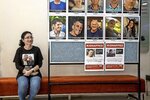A border kibbutz is rebuilding from the ashes
KIBBUTZ BE’ERI — Autumn leaves felled by rain and wind are being raked. The grass has grown green. The mammoth printing press is working full steam. But down the bucolic pathways that became killing fields on Oct. 7 when hundreds of Hamas terrorists overran this southern Israel agricultural community, the devastation is still in full view.
Two months after the deadly attack, signs of life are slowly returning to this Gaza border community, one of the hardest hit on that holiday weekend. Nearly 10% of the kibbutz’s 1,300 residents were murdered.
The printing press, which is the kibbutz’s main source of income and which escaped damage due to being nearly empty at the time of the attack, is abuzz with activity. Managers were determined to reopen the press — where drivers’ licenses, credit cards, bank checks and shopping gift cards are printed — the very week after the attack.
“The opening of the printing press was a very symbolic move to show residents of the community and the whole border area that there is a rebirth,” said Ben Sochman, 47, manager of the site, whose 77-year-old mother, Tamar, was shot dead outside her home by the terrorists on the morning of the attack. “Our hope is that out of all this pain, there can be some growth.”
Deputy marketing manager Naor Pakciarz, 45, whose father-in-law was also murdered in the attack, said, “It will take years to rehabilitate the kibbutz,” but added that “we understood that the kibbutz would not be resettled if the printing press was not first running.
Today, 300 of the 350 printing press workers are already back at their jobs — many commuting to their temporary homes in Dead Sea hotels or elsewhere for work.
A hardcore group of scores of young kibbutz members have returned home braving the thunderous booms of artillery explosions from the IDF tanks fighting nearby, and the continuing if dwindling number of rocket attacks from Gaza two months into the war.
At the entrance to the building, a makeshift memorial honors the 13 press workers who were among the roughly 100 kibbutz members killed or abducted by Hamas.
Tatiana Kosziykovec, 52, of Netivot, who was working at the reception on the morning of the attack, is back at her desk. When she heard the sirens and saw the Hamas gunmen burst through the kibbutz gate she took cover in a small technicians’ room hidden behind the lobby, taking her belongings with her so that the terrorists would not realize anyone was in the building.
“They came to murder,” she told JNS. They sprayed the entryway with bullets, she recalled, and then, thinking no one was inside, exited to carry out their rampage in the kibbutz. The Belarus native, who immigrated to Israel two decades ago, remained hidden in the tiny room for 24 hours, losing contact with her family as her phone battery died.
The electricity was out on the kibbutz until the all-clear was sounded. In the afternoon, Mai, a kibbutz dog, suddenly was at the door and whimpered to come in. At first she thought it was a trick by the terrorists to have her open the door, only to realize the four-legged friend was on her own, so the two huddled together in safety until the next day.
Inside the printing press, the most vivid signs of damage are the bullet holes on the TV in the “nostalgia room,” which houses a collection of technological antiques including Apple computers, printers, a rotary phone and a 1956 military flier printed here which reads, “The desire to be victorious is the first condition for victory.” (An LD representative offered to give the kibbutz 10 free TVs to replace the damaged one. The kibbutz politely declined and are keeping the broken one as a sign of rebirth.)
“We are here” reads the huge sign on the water tower opposite the newly reopened kibbutz secretariat, and the dining hall. Even the laundry is being serviced.
“I couldn’t sit back and see the kibbutz laying desolate like a museum or a safari,” said Noam Gold, 25, a kibbutz native who had been living in Tel Aviv but has been staying at the community with her father for the last month. “That we are here and together — it gives one a lot of hope for the future,” she said. “They thought they would kill us out, but here we are. We are back.”
As the sun set on the kibbutz, IDF soldiers placed Hanukkah candles on the window frames of the scores of demolished, blackened homes, their light shining in the dark night.









